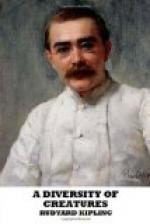(1911)
The Rt. Hon. R.B. Haldane, Secretary of State for War[6], was questioned in the House of Commons on April 8th about the rocking-horses which the War Office is using for the purpose of teaching recruits to ride. Lord Ronaldshay asked the War Secretary if rocking-horses were to be supplied to all the cavalry regiments for teaching recruits to ride. ‘The noble Lord,’ replied Mr. Haldane, ’is doubtless alluding to certain dummy horses on rockers which have been tested with very satisfactory results.’... The mechanical steed is a wooden horse with an astonishing tail. It is painted brown and mounted on swinging rails. The recruit leaps into the saddle and pulls at the reins while the riding-instructor rocks the animal to and fro with his foot. The rocking-horses are being made at Woolwich. They are quite cheap.
—Daily Paper.
[Footnote 6: Now Viscount Haldane of Cloan.]
My instructions to Mr. Leggatt, my engineer, had been accurately obeyed. He was to bring my car on completion of annual overhaul, from Coventry via London, to Southampton Docks to await my arrival; and very pretty she looked, under the steamer’s side among the railway lines, at six in the morning. Next to her new paint and varnish I was most impressed by her four brand-new tyres.
‘But I didn’t order new tyres,’ I said as we moved away. ’These are Irresilients, too.’
‘Treble-ribbed,’ said Leggatt. ‘Diamond-stud sheathing.’
‘Then there has been a mistake.’
‘Oh no, sir; they’re gratis.’
The number of motor manufacturers who give away complete sets of treble-ribbed Irresilient tyres is so limited that I believe I asked Leggatt for an explanation.
‘I don’t know that I could very well explain, sir,’ was the answer. ’It ’ud come better from Mr. Pyecroft. He’s on leaf at Portsmouth—staying with his uncle. His uncle ’ad the body all night. I’d defy you to find a scratch on her even with a microscope.’
‘Then we will go home by the Portsmouth road,’ I said.
And we went at those speeds which are allowed before the working-day begins or the police are thawed out. We were blocked near Portsmouth by a battalion of Regulars on the move.
‘Whitsuntide manoeuvres just ending,’ said Leggatt. ’They’ve had a fortnight in the Downs.’
He said no more until we were in a narrow street somewhere behind Portsmouth Town Railway Station, where he slowed at a green-grocery shop. The door was open, and a small old man sat on three potato-baskets swinging his feet over a stooping blue back.
‘You call that shinin’ ’em?’ he piped. ’Can you see your face in ’em yet? No! Then shine ’em, or I’ll give you a beltin’ you’ll remember!’
‘If you stop kickin’ me in the mouth perhaps I’d do better,’ said Pyecroft’s voice meekly.
We blew the horn.
Pyecroft arose, put away the brushes, and received us not otherwise than as a king in his own country.




